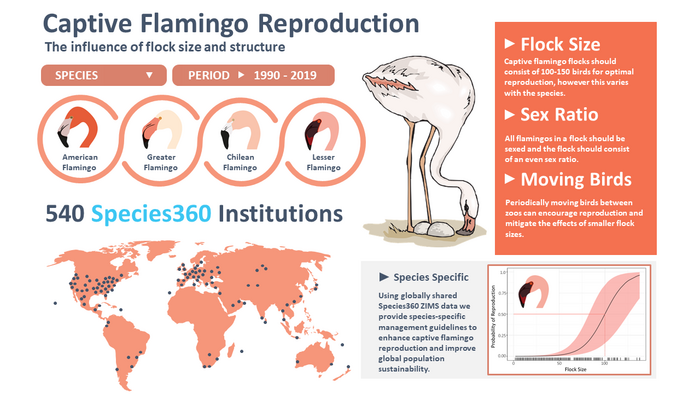Flocking flamingos in groups of 50 or more may be one key to encouraging successful reproduction, according to a study published this month in Zoo Biology. Researchers used global data shared by zoos and aquariums to study reproductive success and factors such as climate, flock numbers, and an equal sex ratio in four species of flamingo in 540 ex situpopulations worldwide. The zoos and aquariums curate data on groups of flamingos using the Zoological Information Management System (ZIMS) provided by the nonprofit Species360.

Credit: Dr. Andrew Mooney
Flocking flamingos in groups of 50 or more may be one key to encouraging successful reproduction, according to a study published this month in Zoo Biology. Researchers used global data shared by zoos and aquariums to study reproductive success and factors such as climate, flock numbers, and an equal sex ratio in four species of flamingo in 540 ex situpopulations worldwide. The zoos and aquariums curate data on groups of flamingos using the Zoological Information Management System (ZIMS) provided by the nonprofit Species360.
The open-access paper in Zoo Biology looks at strategies for encouraging reproductive success in ex situ populations of flamingos, or flamingos living in zoological institutions like wildlife refuges, zoos, and aquariums. Population managers across the national and regional zoo and aquarium associations as well as other organizations, can use this information to provide guidelines for protecting and sustaining flamingo populations.
The Conservation Science Alliance (CSA),and University of Southern Denmark data analysts and population management scholars, collaborated with lead researcher Dr. Andrew Mooney, Conservation and Research Officer at Dublin Zoo, and former Ph.D. student of the CSA, who graduated from Trinity College Dublin, to complete the study.
Applying modern analytics to ZIMS data, the team found that, to encourage reproduction and sustain populations, ex situ flamingo flocks should be as large as 50 –100 individuals and consist of an even sex ratio. Additionally, adding new individuals to a flock can sometimes seemingly spice things up and increase reproductive success, while climatic variables play a limited role.
Dr. Johanna Stärk, study co-author and researcher with University of Southern Denmark and the Species360 Conservation Science Alliance, said: “High quality data collected by Species360 members worldwide is critical for improving our understanding of what animals under human care need. At the Species360 Conservation Science Alliance, we aim to transform ZIMS data into real-world recommendations by working in close collaboration with researchers and species experts. This study is an excellent example of such a successful collaboration that could lead to more sustainable population management and improve global conservation efforts for flamingos.”
Describing the approach, lead researcher Dr. Andrew Mooney says:
“We utilized current and historic zoological records from Species360 member institutions to investigate how flock size and structure influence reproductive success in captive flamingos. We combined demographic data with high resolution global climatic data within the same statistical modeling framework to gain a more complete view of the determinants of reproductive success in captive flamingo populations, while also revealing temporal trends in institutional flock sizes.”
Dr. Mooney continues, “This has been seen first-hand at Dublin Zoo, where we have found that adding new birds to our Chilean flamingo flock stimulated reproduction in the subsequent year, while rainfall had little impact.”
For more information, read the full study: onlinelibrary.wiley.com/doi/full/10.1002/zoo.21753
Journal
Zoo Biology
DOI
10.1002/zoo.21753
Method of Research
Data/statistical analysis
Subject of Research
Animals
Article Title
Flock size and structure influence reproductive success in four species of flamingo in 540 captive populations worldwide
Article Publication Date
15-Jan-2023
COI Statement
The authors declare no conflict of interest.




